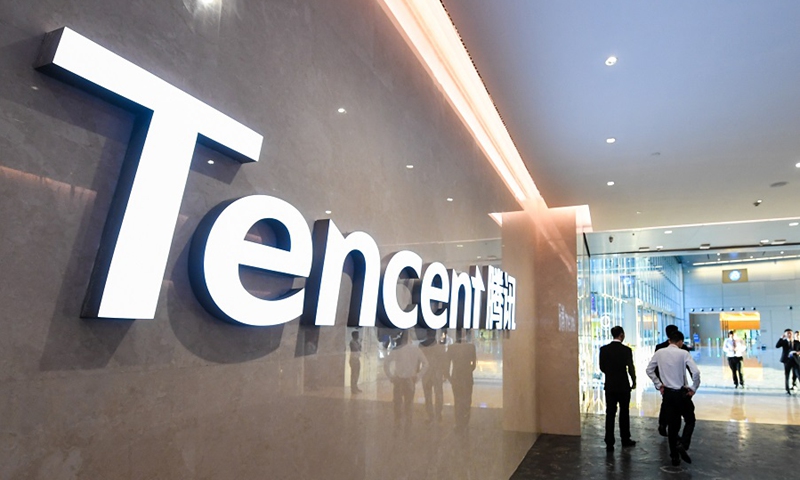Investment arms of China Unicom, Tencent approved for new JV
Move helps boost nation's digital economic prowess

Tencent File photo: Xinhua
The investment arms of state-owned telecom operator China Unicom and internet behemoth Tencent have gained unconditional regulatory approval for a newly created joint venture (JV), according to an official document widely circulated on Wednesday, a major progress of the country's mixed-ownership reforms.The approval for the new JV, which made headlines on Wednesday afternoon, sparked heated discussion over how the powerful duo will spearhead telecom innovations with the state-private tie-up.
In the eyes of industry watchers - who cautioned against misinterpreting the link-up as state capital buying into Tencent - the JV will help cement the country's digital economic prowess and help with the national drive for security and self-control in digital infrastructure.
The JV between Unicom Innovation Venture Capital and Shenzhen Tencent Industry Venture Capital Co was on a list of unconditionally approved concentrations of business operators published by the State Administration for Market Regulation (SAMR) on October 27.
The SAMR list had been under the radar until Wednesday afternoon, when news about the JV began to draw attention. Buoyed by an outburst of media reports about the regulatory nod, shares of China Unicom briefly soared by the daily 10 percent limit shortly after 2pm in Shanghai trading after staying largely flat for the day.
Tencent's Hong Kong-traded shares ended up 1.41 percent on Wednesday, as the Hong Kong market was suspended at 1:55 pm after Typhoon Signal No.8 was issued.
In a filing with the Shanghai Stock Exchange late on Wednesday, China Unicom said that the new JV will focus mainly on its content delivery network (CDN) and edge computing businesses, and it has set its sights on indigenous research and development. The new JV is still being set up and it's yet to be registered, per the filing.
China Unicom said the new JV has no major impact on its current production and operations, while over the longer run it will strengthen CDN and edge computing supply chains.
Tencent has yet to publicly comment on the new JV.
Upon the deal's completion, Unicom Innovation Venture Capital will hold a 48 percent stake in the JV, Shenzhen Tencent Industry Venture Capital will have a 42 percent stake, and a platform for relevant employees' shareholding will have the remaining 10 percent, media reports said on Wednesday.
Founded in Beijing in April 2014, Unicom Innovation Venture Capital, whose ultimate controller is China Unicom, mainly engages in self-funded investment. The Tencent investment unit, for its part, was created in September 2019 in South China's Guangdong Province, principally committed to telecommunications and socializing, digital content and fintech.
Relevantly, Lu Shan, senior executive vice president at Tencent also serves as a board member at China Unicom, the Beijing News reported on Wednesday, citing business data provider Qichacha.
In addition, a Shenzhen-based internet firm was founded in 2021, with Unicom Innovation Venture Capital taking an 18 percent stake, while the Tencent investment affiliate holds a 5 percent stake.
The JV is likely to capitalize on the strengths of both sides to achieve more secure and self-controlled digital infrastructure, Wang Peng, an assistant professor at the Gaoling School of Artificial Intelligence at the Renmin University of China, told the Global Times on Wednesday.
As a major telecom operator, China Unicom has tremendous advantages in digitalized technological infrastructure, notably base stations and networks. The carrier has also been transitioning toward gaining a foothold in the application market, Wang said.
In the case of Tencent, one of the country's top digital economy firms, its encompassing portfolio of content operations, websites, apps and user services, will certainly sharpen the new JV's competitiveness as a hybrid champion spanning new infrastructure, platforms and applications, according to analysts.
The new firm is likely to be a pioneer among an increasing number of compliant digital businesses that are set to join the country's digital economic push, Wang stressed.
In another sign of such closer link-ups, Jingdong Digits Technology Holding Co, the fintech unit of Chinese retailer JD.com, signed a strategic cooperation agreement with the Shanghai subsidiary of China Mobile, the larger peer of China Unicom, on Tuesday.
Under the agreement, the two sides will jointly advance innovations in smart cities, digital government, data centers, cloud computing and big data, among other areas.
The JV between the state-owned telecom operator and the private titan is expected to strike a balance between management mechanisms that prevail in state firms and those that typify private entities, Liu Dingding, a Beijing based veteran market analyst, told the Global Times on Wednesday.
On Tuesday, Dutch internet conglomerate Prosus NV and its South African parent Naspers denied media reports that they are in talks to sell their large stakes in Tencent to a group of investors led by Chinese state-owned investment firm CITIC.
In August 2019, the State-owned Assets Supervision and Administration Commission of the State Council said in a post on the WeChat account of its media center that centrally administered firms' deepening pragmatic partnerships with internet firms were intended to push the incorporation of the digital economy into the real economy.
Nonetheless, such partnerships and instances of mixed-ownership reforms have been incorrectly characterized as public-private partnerships, according to the post, which criticized baseless clickbait.

